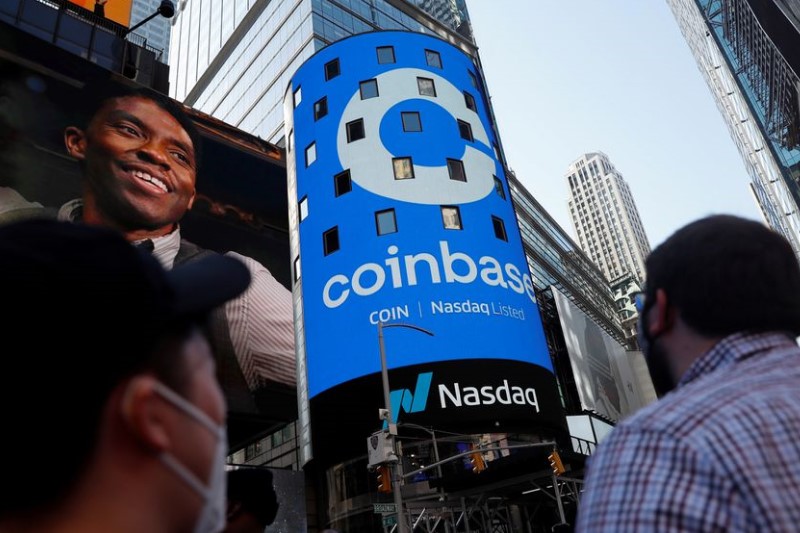(Bloomberg) -- They were hailed as Silicon Valley’s answer to the traditional Wall Street IPO. A way for founders of hot tech startups to sidestep the hefty fees and the millions of dollars potentially left on the table when bankers took them public.
But now, some are wondering whether direct listings can live up to the hype.
A string of high-profile direct listings, including Squarespace Inc. and ZipRecruiter Inc. flopped recently, but Coinbase Global Inc. was particularly notable. Since going public in April with plenty of fanfare, the cryptocurrency exchange has slumped, even dropping below its so-called reference price, a level skeptics have called an artificially low bar to pass. Squarespace breached its reference price its debut session, the first direct listing to do so. A muted start for ZipRecruiter stood out from a series of pops by traditional initial public offerings.
Meanwhile, initial public offerings made a comeback and the spectacular, albeit short-lived, rise of SPACs has also pushed direct listings out of the limelight.
“We hit the peak of the hype cycle,” said Nick Colas, co-founder of DataTrek Research. “Now, everyone is taking a step back to reset expectations on prices and near-term volatility.”
The next test could come with app-maker TrillerNet, which reportedly plans to file for a direct listing next month at a valuation of more than $5 billion. Other companies advancing plans for possible direct listings include analytics startup Amplitude Inc. and digital-payments provider Wise, the first major technology company to choose this route in the U.K.
Representatives for Coinbase and Squarespace declined to comment. ZipRecruiter didn’t respond to a request for comment.
Read more: Coinbase’s Whipsaw Debut Takes It Past $100 Billion, Then Back
Spotify Technology SA (NYSE:SPOT) put direct listings on the map more than three years ago when it opted to list in the U.S. without hiring a long list of banks to run the traditional marketing blitz to sell its shares through an IPO. A half dozen other well-known tech companies like Palantir Technologies Inc. followed by directly listing nearly $200 billion of equity on New York exchanges based on their market capitalization when they debuted. Unlike IPOs, direct listings typically don’t raise money.
The recent stumbles coincided with a general pullback in U.S. equities in April and May and traditional IPOs weren’t immune. Still, direct listings haven’t caught on with the same momentum as another newly popular way of going public: merging with a special purpose acquisition company that conducted its own IPO.
In another sign that attention has moved on, the meme-stock phenomenon has allowed hordes of small investors to push back against big Wall Street players and cash in on beaten up shares of long-listed companies like AMC Entertainment (NYSE:AMC) Holdings Inc. and GameStop Corp (NYSE:GME).
But direct listings were meant to be a better mechanism for going public -- hailed by venture capitalists as a way to side-step banking fees and a process criticized as favoring the best clients of Wall Street firms.
That 7% fee can stand out to executives and investors who are more accustomed to 2% fees during private stock sales.
“The only two places where spreads haven’t narrowed in the last 20 years is houses and IPOs,” Colas said, referring to the fees bankers earn on these deals. “From the venture capital standpoint, I don’t know this trading is going to change their minds a whole lot, because they still see that 7% spread.”
Direct listings may be working as designed by their private investors, but they’ve left public investors flummoxed on more than one occasion. Scrutiny of reference prices -- a figure provided on the first day of trading as guidance -- surround each debut, and have contributed to wild price swings.
“The process around setting a reference price is probably something that needs to be looked at more closely,” MKM Partners analyst Rohit Kulkarni said in an interview. “Simply because there is no clear and hard evidence of what appetite investors have prior to the setting of the reference price -- very much unlike the book building process in an IPO.”
With much less historical data available than for IPOs, traders then have trouble with basic questions such as when to enter their position.
“The market is still trying to figure direct listings out,” University of Florida finance professor Jay Ritter said in an interview. “The opening price has been higher than the closing price with most of them. I don’t expect that to continue, because the people who are buying at the open are going to say, ‘Well if there’s a predicable price decline during the day, why should I buy at the open instead of the afternoon?’”
Bumpy Path
To some, the volatility and uncertainty are a small trade-off for a more democratic way to go public that doesn’t let investment bankers award shares to preferred clients at a discount. But cracks are emerging in that line of thinking, too. Coinbase raised $1.25 billion in private offering of equity-linked securities one month after its listing that was designed to skip an IPO.
For Coinbase Chief Financial Officer Alesia Haas, the opaque supply-demand dynamics are the hardest part of going public by direct listing.
“You’re not allowed to ask your investors what they plan to sell, and so you go in with a lot of unknowns,” Haas said at the Bloomberg Deals Summit, adding that this can create a “bumpy path” for a listing.
©2021 Bloomberg L.P.
